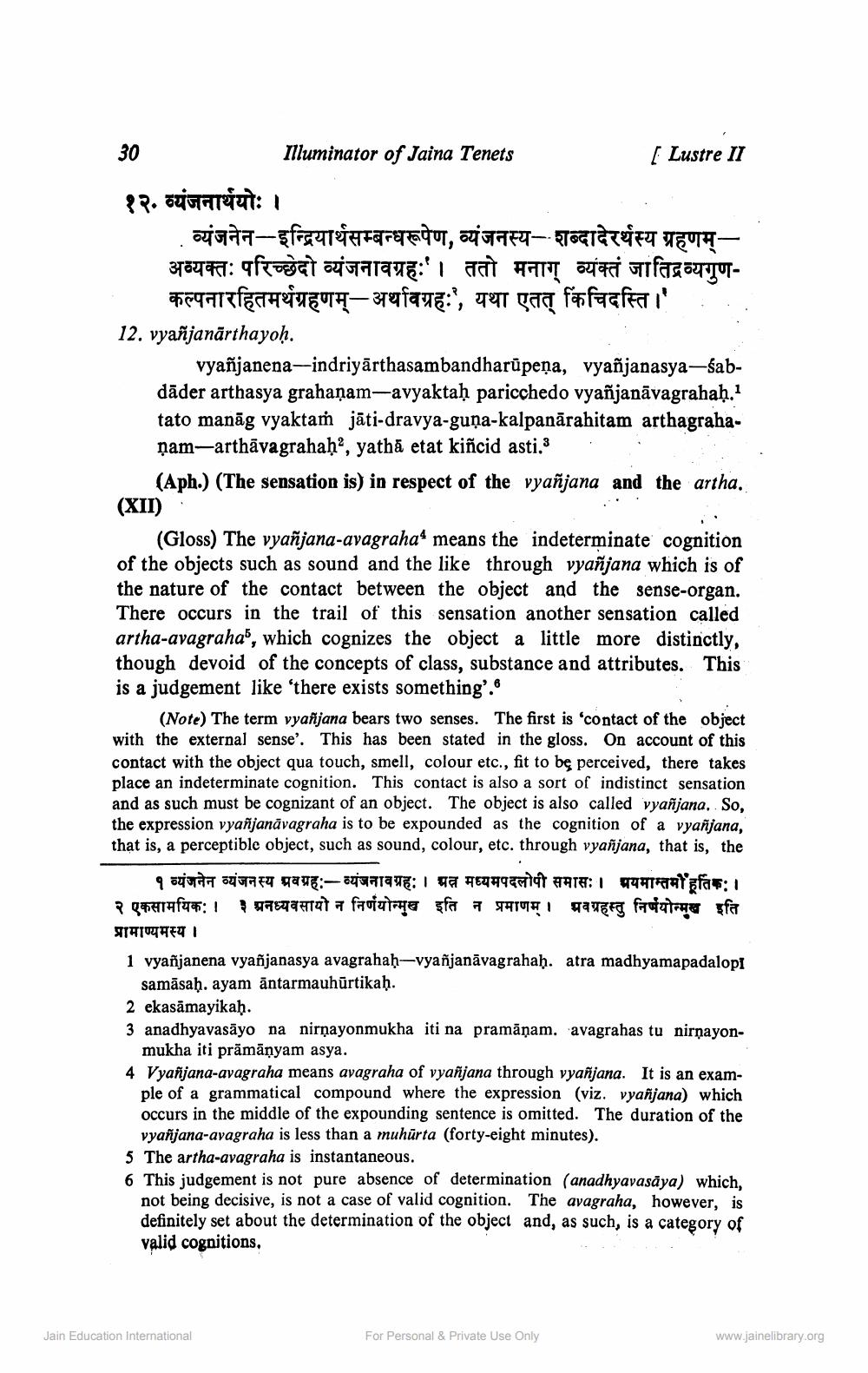________________
30
Illuminator of Jaina Tenets
[ Lustre II 87. teftaret:
... व्यंजनेन-इन्द्रियार्थसम्बन्धरूपेण, व्यंजनस्य-शब्दादेरर्थस्य ग्रहणम्अव्यक्तः परिच्छेदो व्यंजनावग्रहः । ततो मनाग व्यक्तं जातिद्रव्यगुण
कल्पनारहितमर्थग्रहणम्-अर्थावग्रहः', यथा एतत् किंचिदस्ति।' 12. vyañjanārthayoḥ.
vyañjanena--indriyārthasambandharūpeṇa, vyañjanasya—śabdāder arthasya grahaņam-avyaktaḥ paricchedo vyañjanāvagrahah." tato manāg vyaktaṁ jāti-dravya-guna-kalpanārahitam arthagrahaņam-arthāvagrahaḥ, yathā etat kiñcid asti.3
(Aph.) (The sensation is) in respect of the vyañjana and the artha. (XII):
(Gloss) The vyañjana-avagraha“ means the indeterminate cognition of the objects such as sound and the like through vyañjana which is of the nature of the contact between the object and the sense-organ. There occurs in the trail of this sensation another sensation called artha-avagraha, which cognizes the object a little more distinctly, though devoid of the concepts of class, substance and attributes. This is a judgement like 'there exists something'.
(Note) The term vyañjana bears two senses. The first is 'contact of the object with the external sense'. This has been stated in the gloss. On account of this contact with the object qua touch, smell, colour etc., fit to be perceived, there takes place an indeterminate cognition. This contact is also a sort of indistinct sensation and as such must be cognizant of an object. The object is also called vyañjana. So, the expression vyanjanāvagraha is to be expounded as the cognition of a vyañjana, that is, a perceptible object, such as sound, colour, etc. through vyañjana, that is, the
१ व्यंजनेन व्यंजनस्य प्रवग्रह:- व्यंजनावग्रहः । अत्र मध्यमपदलोपी समासः । अयमाम्तमा हर्तिकः। २ एकसामयिकः। अनध्यवसायो न निर्णयोन्मुख इति न प्रमाणम्। प्रवग्रहस्तु निर्णयोन्मुख इति प्रामाण्यमस्य। 1 vyañjanena vyañjanasya avagrahaḥ-vyañjanāvagrahah. atra madhyamapadalopi
samāsah. ayam āntarmauhūrtikah. 2 ekasāmayikaḥ. 3 anadhyavasāyo na nirņayonmukha iti na pramāņam. avagrahas tu nirnayon
mukha iti prāmāṇyam asya. 4 Vyañjana-avagraha means avagraha of vyañjana through vyañjana. It is an exam
ple of a grammatical compound where the expression (viz. vyañjana) which occurs in the middle of the expounding sentence is omitted. The duration of the vyañjana-avagraha is less than a muhürta (forty-eight minutes). 5 The artha-avagraha is instantaneous. 6 This judgement is not pure absence of determination (anadhyavasāya) which,
not being decisive, is not a case of valid cognition. The avagraha, however, is definitely set about the determination of the object and, as such, is a category of valid cognitions,
Jain Education International
For Personal & Private Use Only
www.jainelibrary.org




